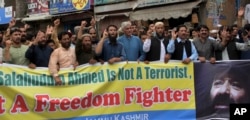Pakistan has criticized the United States for declaring an anti-India Kashmiri rebel leader as a global terrorist and defended militants fighting New Delhi’s rule in Kashmir as a “legitimate" struggle for freedom.
The State Department on Monday imposed sanctions on Syed Salahuddin, the Pakistan-based chief of Hizbul Mujahideen, the main rebel group fighting Indian rule in the divided Kashmir region.
It said that the 71-year-old militant commander committed, or poses "a significant risk of committing, acts of terrorism that threaten the security of U.S. nationals or the national security, foreign policy, or economy of the United States."
A Pakistani Foreign Ministry spokesman on Tuesday criticized the move.
"The 70-year-old indigenous struggle of Kashmiris in the Indian occupied Jammu and Kashmir remains legitimate. The designation of individuals supporting the Kashmiri right to self-determination as terrorists is completely unjustified," said Nafees Zakaria.
Pakistan, he reiterated, will continue its “political, diplomatic and moral support for the just struggle of the Kashmiri people.”
The U.S. move came hours before Indian Prime Minister Narendra Modi began an official visit to Washington.
India controls two-thirds of Kashmir while Pakistan controls the rest. The nuclear-armed rivals claim the Himalayan region in its entirety and have fought two of their three wars over it.
New Delhi, which hailed Monday’s decision by Washington, accuses Islamabad of fueling the 28-year-old armed rebellion in the Muslim-majority Kashmir, accusations Pakistan rejects.
Salahuddin comes from Badgam town in Indian-ruled Kashmir. Salahuddin turned to militancy after losing an election for the region’s legislative assembly in 1987, which he alleged was rigged by India.
He has been mostly based on the Pakistan side since 1990 and gone back repeatedly for insurgent activities in the Indian-administered portion of the region as well for meeting his family there.
The rebel commander is seen as a hero in Kashmir and has a large following.
"In September 2016, Salahuddin vowed to block any peaceful resolution to the Kashmir conflict, threatened to train more Kashmiri suicide bombers, and vowed to turn the Kashmir valley “into a graveyard for Indian forces," according to Monday's announcement by the U.S.
In a video message on Monday, Salahuddin called for a week of resistance, including two days of strikes starting July 8, the anniversary of last year’s killing of young, charismatic rebel leader Burhan Wani by Indian security forces.
Wani's death provoked violent anti-India protests across the region, prompting Indian security forces to use force to suppress the uprising. Wani was a key member of Salahuddin’s group and played a role in reinvigorating the militancy in Kashmir. He was actively using social media to gather support for the insurgency.
“Over the past one year, the world has witnessed an intensification of the brutal policies of repression being pursued by the Indian occupation forces...Despite this relentless state terror, the Kashmiris remain undeterred and unbowed,” said Pakistani spokesman Zakaria.






